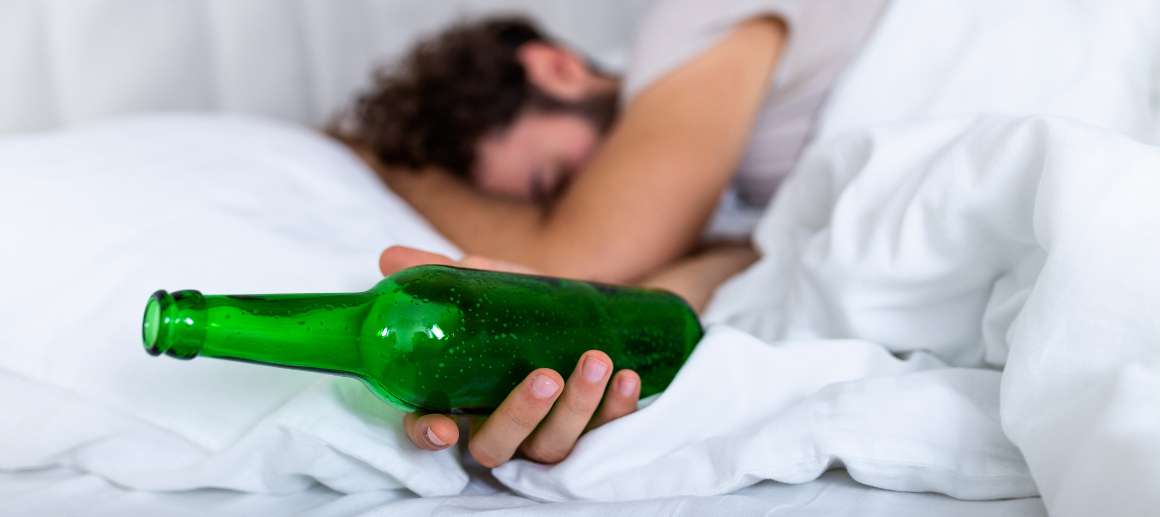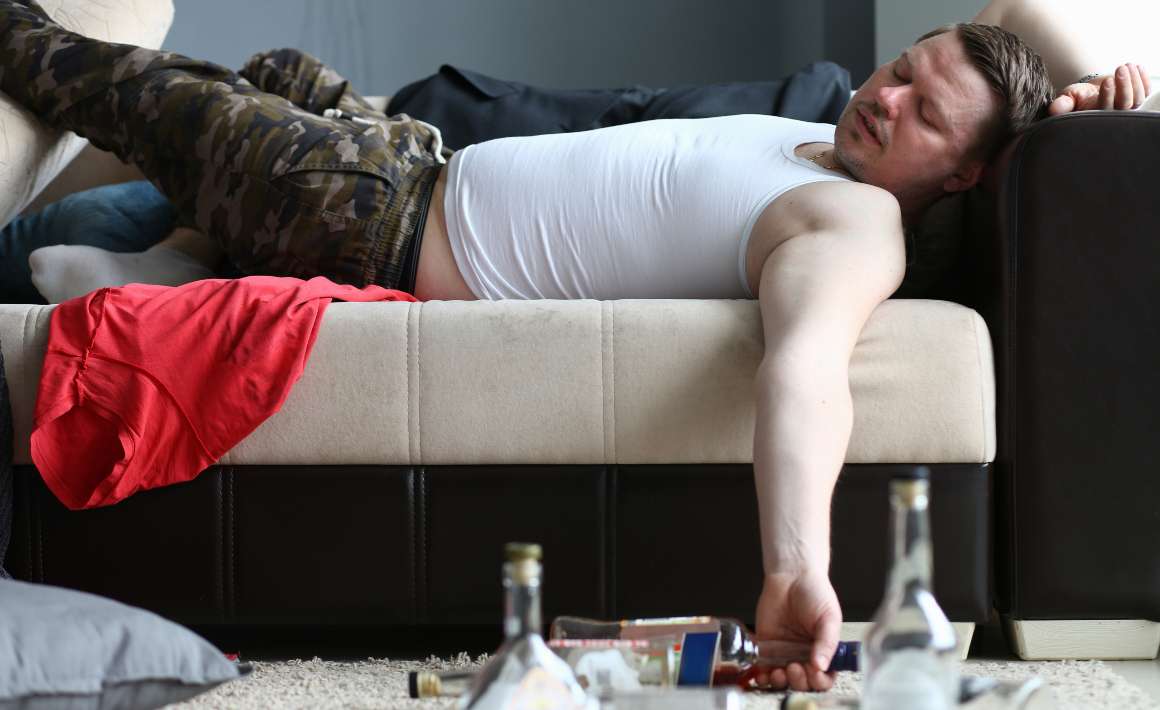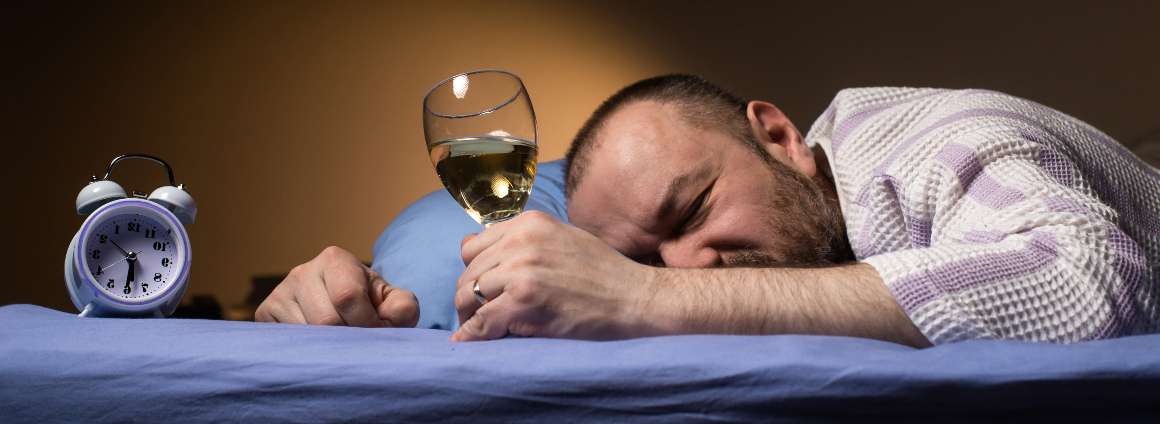Alcohol and Sleep: Effects on Quality, Duration, and Health
Published:
Picture this: you've had a long day and decide to unwind with a glass of wine or two before bed, convinced that alcohol and sleep are the perfect pairing for relaxation.
Contents:
- Alcohol's Impact on Sleep Quality and Duration
- Imbalance Between Slow-Wave Sleep and REM Sleep
- The Relationship Between Age, Alcohol Consumption, and Sleep Quality
- Men at Higher Risk Due to Greater Alcohol Consumption Rates
- Persistent Alcohol Dependence and Insomnia
- Alcohol Consumption and Sleep Apnea: A Recipe for Poor Sleep Quality
- FAQs in Relation to Alcohol and Sleep
- Conclusion
However, despite the sedative effects of alcohol initially helping you drift off, your sleep quality may be compromised throughout the night. In this blog post, we'll delve into how alcohol affects various stages of the sleep cycle and its impact on both duration and quality.
We'll take a look at how alcohol use can cause an imbalance between SWS and REM sleep, leading to disturbed sleeping patterns. Furthermore, we'll discuss how age-related changes in alcohol-induced sleeping patterns occur as well as gender differences in drinking habits affecting sleep.
In addition to these factors, we will examine how persistent alcohol dependence can contribute to insomnia development over time. By understanding the complex relationship between alcohol consumption and our nightly restorative slumber sessions – from occasional drinkers to chronic users – we aim to shed light on ways individuals can improve their overall health by making informed choices about their lifestyle habits surrounding "alcohol and sleep."

Alcohol's Impact on Sleep Quality and Duration
Let's talk about the elephant in the room - alcohol consumption.
We all know that a nightcap might help you doze off, but how does it affect your overall sleep quality?
Well, buckle up because we're diving into the science behind alcohol and its impact on your precious Zzzs.
The Role of Alcohol as a Central Nervous System Depressant
You see, alcohol is a central nervous system depressant, which means it slows down brain activity.
This sedative effect can initially make falling asleep easier by reducing onset latency (the time it takes to fall asleep).
How Alcohol Reduces Onset Latency
In moderation, this may not seem like such a bad thing. Who doesn't want to drift off faster after a long day?
Consuming large amounts of alcohol before bed can cause serious sleep issues.
Poor Sleep Quality Due to Disrupted Sleep Stages
- NREM Sleep: Alcohol affects both non-rapid eye movement (NREM) and rapid eye movement (REM) phases of your slumber cycle. It increases deep NREM sleep during the first half of the night while suppressing REM stages crucial for cognitive functioning and memory consolidation (source).
- Sleep Deprivation: This imbalance between NREM and REM leads to poor sleep quality, making you feel groggy and unrested the next day.
- Chronic Sleep Problems: Over time, regular alcohol consumption can contribute to chronic sleep problems like insomnia or obstructive sleep apnea (source).
In short, drinking alcohol can appear to help you drift off faster in the beginning, but it could eventually result in worse sleep quality and more severe issues over time.
So next time you're tempted to reach for that nightcap before bed, consider the potential consequences on your precious beauty rest.

Imbalance Between Slow-Wave Sleep and REM Sleep
When you drink alcohol before bedtime, it can create an imbalance between slow-wave sleep (SWS) and rapid eye movement (REM) sleep.
Studies have shown that alcohol consumption suppresses REM during the first two cycles of slumber, which disrupts normal sleeping patterns crucial for memory consolidation and cognitive functioning.
- SWS: Also known as deep sleep, this stage is essential for physical restoration and growth.
- REM: This is when we dream; it plays a vital role in learning, memory retention, and emotional regulation.
Maintaining a healthy balance between these two stages is critical to ensure optimal restorative benefits from your nightly snooze sessions.
Effects of Alcohol Consumption on SWS vs REM Balance
The sedative effects of alcohol might seem like they're helping you fall asleep faster at first glance. However, this temporary boost in drowsiness can ultimately lead to poor sleep quality due to disrupted SWS-REM cycling.
Importance of Maintaining Healthy Sleeping Patterns
A consistent lack of proper balance between SWS and REM may result in chronic sleep problems or other health issues related to inadequate restfulness over time - not ideal.
Therefore, to maintain healthy sleeping patterns it is wise to limit or avoid alcohol close to bedtime and opt for alternatives such as herbal tea or warm milk that can aid relaxation without disrupting sleep. To avoid sleep disturbances caused by alcohol intake, consider limiting or avoiding alcoholic beverages close to bedtime. Instead, opt for healthier alternatives like herbal tea or warm milk that promote relaxation without negatively affecting your sleep stages.
Remember: lifestyle factors like alcohol consumption can significantly affect your sleep cycle, and chronic alcohol users may experience insomnia symptoms, obstructive sleep apnea, prolonged sleep latency, and other sleep disorders. A good night's rest is crucial for maintaining overall well-being and cognitive function.
The Relationship Between Age, Alcohol Consumption, and Sleep Quality
Let's talk about how alcohol affects sleep, especially as we age.
As we grow older, our body's ability to process alcohol changes, making us more susceptible to poor sleep quality caused by excessive drinking.
Studies have shown that heavy drinking in older adults contributes not only to reduced sleep onset but also fragmented REM phases essential for proper mental acuity levels throughout waking hours.
Factors That Influence Susceptibility to Poor Sleep Quality from Alcohol Intake
The aging process affects how our bodies metabolize alcohol.
This means the sedative effects of alcohol may be stronger or last longer in older individuals than in their younger counterparts.
In turn, this can lead to a higher likelihood of experiencing sleep problems after consuming alcoholic beverages before bedtime.

Fragmented REM Phases in Older Adults Who Consume Excessive Amounts of Alcohol
A good night's rest is crucial for maintaining cognitive function as we age.
- Frequent interruptions: Consuming large amounts of alcohol can cause frequent awakenings during the night, which disrupts your REM cycles.
- Poor memory consolidation: Fragmented REM phases hinder memory consolidation processes necessary for optimal brain health.
- Mental fatigue: Sleep disturbances due to excessive drinking often result in daytime drowsiness and decreased alertness.
So what should you do?
The answer is simple: limit your alcohol consumption, especially before bedtime.
By doing so, you can help maintain a healthy sleep-wake cycle and protect your cognitive health as you age.
Men at Higher Risk Due to Greater Alcohol Consumption Rates
Men's greater alcohol consumption rate of 21 or more units per week compared to women (2.4%) leads to a higher risk for sleep problems.
A study found that 15.7% of men consumed 21 or more units of alcohol per week compared to just 2.4% of women.
This significant difference in drinking habits puts men at a higher risk when it comes to both the quality and duration of their sleep.
The Gender Gap in Weekly Alcoholic Unit Consumption Rates Among Seniors
You might be wondering why this is relevant specifically for older adults?
Well, as we age, our bodies become less efficient at processing alcohol, which means its effects on our sleep patterns can become even more pronounced over time.
Impact on Health Risks Associated with Short Sleeps Experienced by Male Drinkers
Beyond feeling groggy after a night out, there are some serious health risks associated with poor sleep quality caused by excessive drinking - especially for men who consume large quantities regularly over time.
- Poor cognitive functioning: Fragmented REM phases can lead to decreased mental acuity levels throughout waking hours.
- Increase in lifestyle factors: Chronic heavy drinkers may also suffer from other lifestyle factors such as obesity and smoking which further exacerbate their disrupted sleeping patterns.
- Sleep disorders: Men who drink heavily are at greater risk for developing chronic sleep problems like insomnia or obstructive sleep apnea.
- Lack of quality sleep can compromise the body's natural defense mechanisms, leaving it vulnerable to disease and illness.
Gents, it's time to take a closer look at your drinking behavior and make some adjustments for the sake of better sleep.
Instead of consuming alcohol before bedtime, consider opting for non-alcoholic alternatives; it will pay off in the long run.

Persistent Alcohol Dependence and Insomnia
You might be surprised to learn that persistent alcohol dependence can lead to insomnia. According to research, those who consistently drink heavily over fifteen years have a higher risk of developing insomnia compared to individuals without any history of substance abuse (source).
This highlights the importance of limiting your alcohol consumption before bed, not just for a good night's rest but also for maintaining overall health.
- The Link Between Consistent Heavy Drinking and Sleep Disorders
It's essential to understand the link between consistent heavy drinking and sleep disorders. Moderating your alcohol intake is crucial not only for better restfulness but also for preventing chronic sleep problems like insomnia from developing in the first place.
- Actionable Tips for Reducing Alcohol Intake
Here are some practical ways you can cut back on your nightly booze consumption:
- Set limits: Decide how many drinks you'll allow yourself per week and stick to it.
- Create an alternative bedtime routine: Replace your evening drink with herbal tea or another non-alcoholic beverage.
- Avoid triggers: Identify situations where you're more likely to consume excessive amounts of alcohol and find healthier alternatives.
- Talk to someone: Reach out to friends, family members, or professionals if you need support in cutting back on your drinking habits.
Sleep Apnea Exacerbated by Alcohol Intake
Sleep apnea is one such disorder that could be worsened or even induced by alcohol consumption. Characterized by abnormal breathing patterns and temporary loss of breath during sleep, this condition can further deteriorate overall restfulness and well-being.
- How Alcohol Affects Individuals with Sleep Apnea
Alcohol relaxes the muscles in your airway, which can lead to more frequent episodes of obstructive sleep apnea.
- Taking Action for Better Sleep Quality
If you're concerned about sleep apnea, reducing your alcohol consumption - particularly before bedtime - is an essential step to enhancing your wellbeing and getting a better night's rest.
Alcohol Consumption and Sleep Apnea: A Recipe for Poor Sleep Quality
Let's talk about a not-so-sweet combination: alcohol and sleep apnea.
Sleep apnea is a disorder characterized by abnormal breathing patterns and temporary loss of breath during slumber. When we add alcohol to the mix, it can worsen existing cases of this pesky condition and lead to disrupted sleeping patterns.
How Alcohol Affects Sleep Quality
Alcohol has sedative effects on our central nervous system, which means our muscles relax - including those in the airway. This can lead to obstructive sleep apnea or worsen existing cases of this condition. The result is fragmented sleep due to frequent awakenings caused by lack of oxygen, which is definitely not ideal for restorative snoozing.
Consequences of Disrupted Sleep Patterns
- Poor cognitive function
- Mood swings
- Increase in accidents
All jokes aside, these are just some examples of the potential consequences that can arise from disrupted sleep patterns due to alcohol-induced sleep apnea.
So, what's the takeaway here? If you're someone who suffers from sleep apnea or simply wants to maintain a healthy sleep-wake cycle, it's best to limit your alcohol consumption - especially before bedtime.
Want additional advice for attaining better sleep? Check out this resourceful link.

FAQs in Relation to Alcohol and Sleep
Does alcohol help you sleep better?
No, alcohol does not help you sleep better. While it may initially have a sedative effect and make it easier to fall asleep, it ultimately disrupts the quality of your sleep by interfering with various stages of the sleep cycle.
What are the effects of drinking alcohol before bed?
Drinking alcohol before bed can lead to poor sleep quality due to disrupted sleeping patterns, imbalance between slow-wave and REM sleep, exacerbation of existing conditions like sleep apnea, and increased risk for developing insomnia.
How does alcohol affect your quality of sleep?
Alcohol affects your quality of sleep by disrupting different stages in the sleep cycle, causing an imbalance between slow-wave (deep) and REM (dreaming) phases. This leads to fragmented and less restorative slumber.
Is it safe to drink alcohol before going to bed?
In moderation, occasional consumption is generally considered safe; however, regular or excessive intake negatively impacts overall health as well as sleep quality. It's best to limit consumption several hours prior to bedtime for optimal rest.
Can drinking too much alcohol lead to insomnia?
Yes, excessive long-term use can contribute towards developing chronic issues such as insomnia. Alcohol-induced sleep disturbances can persist even after abstinence, making it crucial to address alcohol dependence for improved sleep.
Conclusion
Overall, alcohol consumption can have a significant impact on both the quality and duration of sleep. While it may initially help with falling asleep, it disrupts various stages of the sleep cycle and can lead to an imbalance between slow-wave sleep and REM sleep. Additionally, excessive drinking can exacerbate or even cause sleep apnea, particularly in older individuals.
It's important to note that gender differences exist in how alcohol affects sleeping patterns, with men being more susceptible to poor sleep due to alcohol consumption than women. Long-term effects of persistent alcohol dependence include the development of insomnia as well.
Reducing alcohol consumption can be beneficial to both your sleep quality and overall health. For more information on maintaining a healthy lifestyle free from harmful substances like excessive amounts of alcohol read our blog.













